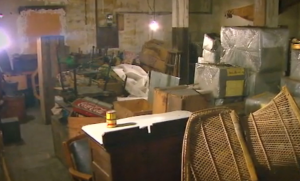 It’s a window into the past lives of Japanese Americans
It’s a window into the past lives of Japanese Americans
It’s a glass floor that leads to a view of a basement.
It’s a basement full of memories and treasures left by Japanese Americans forced to evacuate into internment camps.
They were only allowed to bring two suit cases of belongings to the prisons.
So according to KOMO, one family asked the owner of the Panama Hotel if they could store their belongings there.
The owner said yes, and soon more Japanese American families would bring what they treasured to the basement.
Many of those families never returned. Some died, some may have moved outside the Seattle area.
In 1983, Jan Johnson bought the hotel and recognized the treasures she still had in her basement.
The items found in the treasure chests have been documented and catalogued by historians.
She vowed to leave the personal items there as long as she lives.
“I don’t know why I do it,” said Johnson. “I have a different answer every day.”
Eugenia Woo, Director of Preservation Services for Historic Seattle, thinks she knows why Jan does it.
“This is all everyday life stuff. You start to think about why this is here, and how people’s lives … American’s lives … were uprooted from their homes
Because of what Jan has done, the hotel has been given National Historic Landmark status.
It’s an amazing and fascinating story. You can see the stuff in the basement and hear its stories in the video report from KOMO, below.



RE: A window into Japanese American past: JA artist & subject of “Cats of Mirikitani”, Jimmy Mirikitani would stay in this hotel when he was in Seattle. His older sister lived in the area and was seperated from him during the internment period in WW II. Through the documentary he was finally reunited with his sister, film was released in 2006.